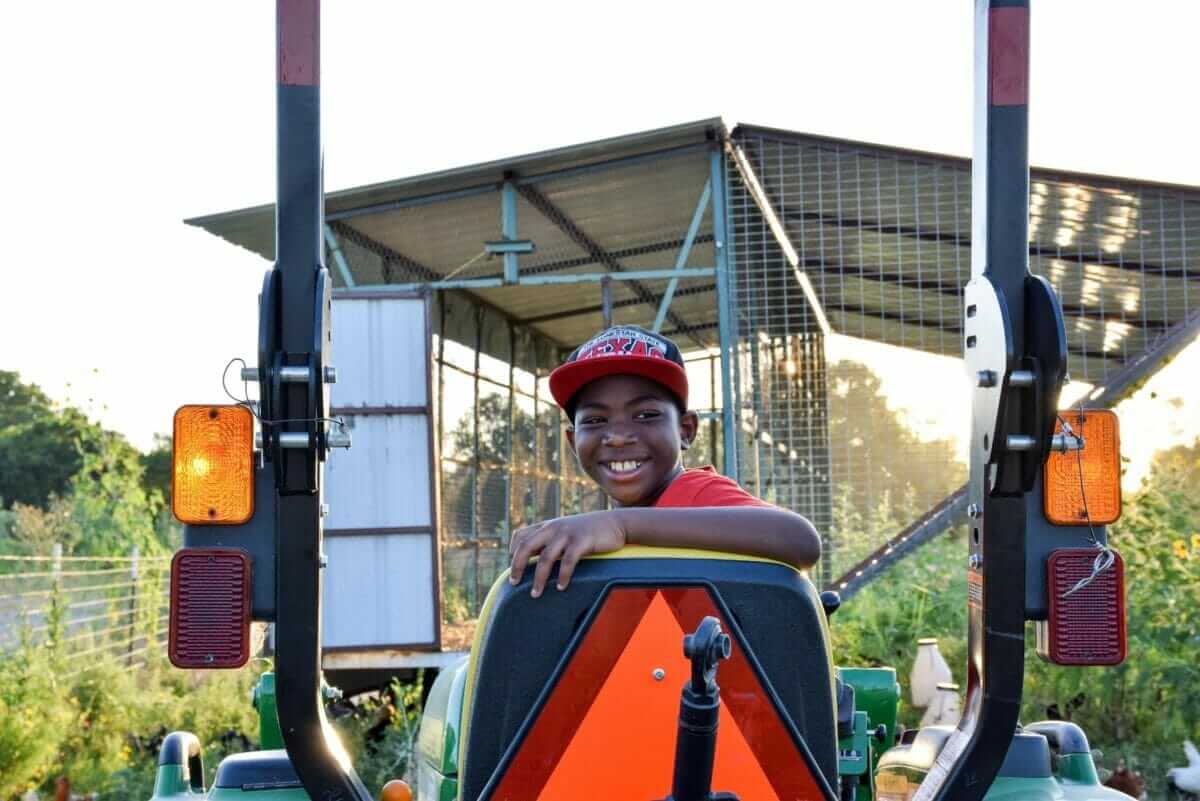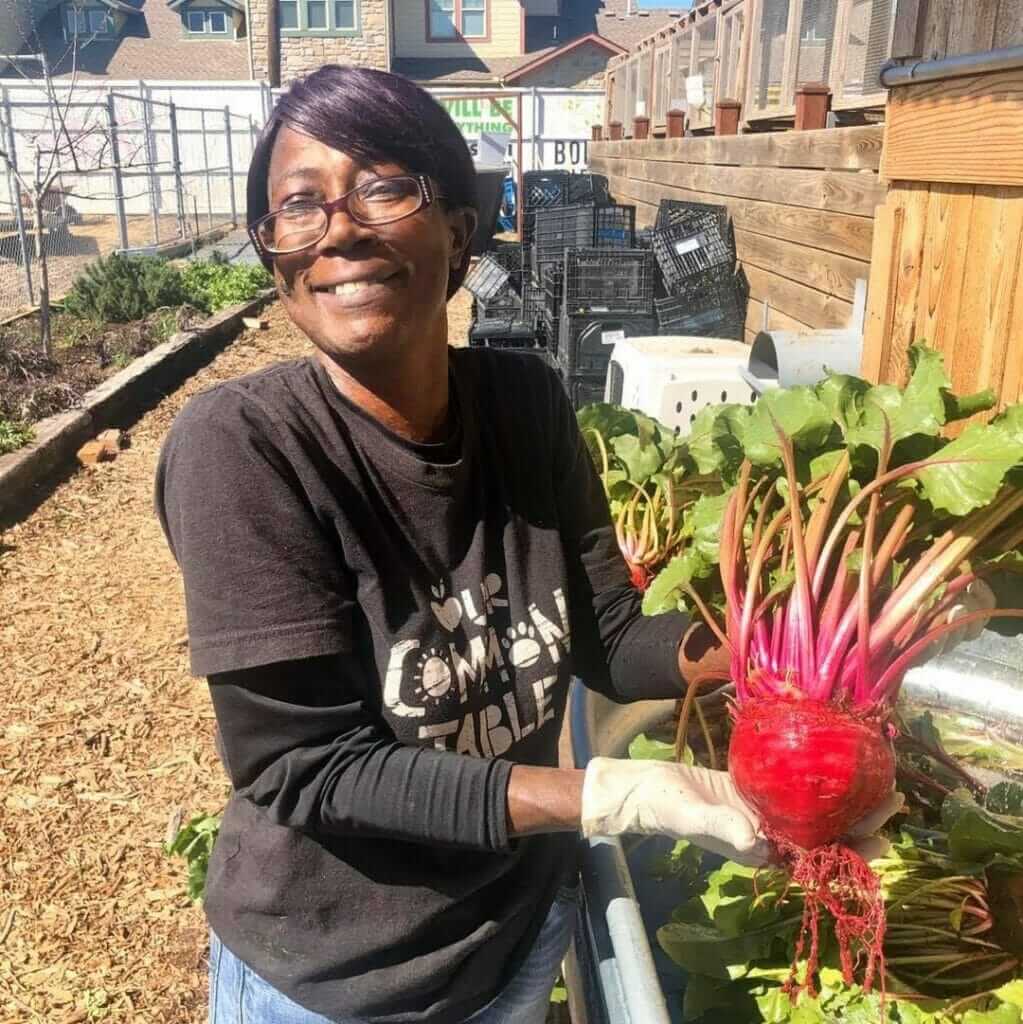Urban Farm Looks to Tackle Food Insecurity in Dallas Neighborhood
Bonton Farms aims to transform a community with fresh food.
Urban Farm Looks to Tackle Food Insecurity in Dallas Neighborhood
Bonton Farms aims to transform a community with fresh food.

Bonton Farms has existed since 2014 to address Bonton’s food desert and concurrent social issues. Courtesy of Bonton Farms.
Fresh food has not always been accessible in the south Dallas neighborhood of Bonton.
It can take residents of the food desert up to three hours to travel to the nearest grocery store and back. The historically African American neighborhood has high rates for diabetes and heart disease, and the lowest average life expectancy of any zip code in Dallas. Around a third of Bonton’s residents live below the poverty line. Workers at an urban farm called Bonton Farms are hoping to change all of that.
The farm’s manager, Danny George, was born and raised in Bonton. He grew up making the long trek to the grocery store on the bus. “It was kind of a headache,” he says of the long commute, which would limit the type and amount of groceries his family could buy. The closest places within walking distance for food in the neighborhood for a long time were the nearby liquor stores, which only sold over-priced and processed products.
But George and other residents have seen the neighborhood’s access to fresh produce change in recent years thanks to the work done by the farm he manages.
Bonton Farms was founded by Daron Babcock, a former VP of a private equity firm. Babcock moved to the neighborhood around eight years ago. He launched a one-acre farm in his backyard after consulting with the local community. He says he thought starting an urban farm might help alleviate the illnesses and unemployment in Bonton.
“I kept asking, ‘what’s going on here,’” Babcock says. “In my mind, it was like a Flint, Michigan thing. Maybe this community was built on an old landfill? Maybe the water was bad? Something had to be wrong with this place and as I asked questions about it, they said ‘no, this is a food desert.’”
Babcock says food insecurity is the root cause of many social issues and that he hopes starting a farm can tackle them while also providing work within the community. Since 2014, Bonton Farms has expanded to include a 40-acre extension farm, a farmer’s market and café. The community’s locally grown produce, eggs, honey and pork are sold to Dallas restaurants, visitors of the farm and the Dallas Cowboys’ training facility in Frisco.
Bonton residents are able to purchase fresh food at a reduced price. Those who are unable to afford the produce can participate in what Babcock refers to as an honorable transaction. This means that community members can volunteer their time on the farm or provide something they feel is the equivalent value in exchange for food. “People get what they need here, but also walk out dignified… We want to keep everybody working and everybody feeling full,” Babcock says.
The farm currently has 37 employees and 44 paid interns, according to Babcock. Doris Young is one of those employees. She has lived in Bonton since she was five years old. Before she started working at the farm, she was struggling financially. “I had no idea how I was going to make ends meet,” she says.
Young now has a driver’s licence, a car and a clean bill of health. She says that having access to farm-fresh options has helped tackle her high blood pressure.
Through partnerships with other community organizations, the farm also offers programming such as nutritional counselling, cooking classes, general health and wellness guidance, housing stability assistance and career mentorship services.
George, who has been working as a farm manager for three years, says Bonton Farms serves as so much more than just somewhere food is grown and sold. It has helped foster a sense of community, he says, and improved people’s lives through education and support. “The farm, it created a safe haven, something we didn’t have,“ he says.

“This is something that I’ve always needed,” Young says. “It’s impacted in so many different ways: mentally, spiritually, physically. It has given me new confidence that I didn’t know I needed.”
But the impact, she says, goes beyond her success, adding that the farm’s existence has allowed her family and friends to have an opportunity to put good food on their table at the end of the day.
“Just to see the community come together to be better and to live better, it’s just amazing to me,” she says. “To know that I am a part of that, it’s just great.”
In the future, the farm plans on opening a preservatory, to have a place where preserves can be sold and residents can learn how they can store their home-grown products for the long term. Babcock says he hopes that Bonton Farms can inspire other communities that have experienced similar issues to take action.
Follow us
This work is licensed under a Creative Commons Attribution-NoDerivatives 4.0 International License.
Want to republish a Modern Farmer story?
We are happy for Modern Farmer stories to be shared, and encourage you to republish our articles for your audience. When doing so, we ask that you follow these guidelines:
Please credit us and our writers
For the author byline, please use “Author Name, Modern Farmer.” At the top of our stories, if on the web, please include this text and link: “This story was originally published by Modern Farmer.”
Please make sure to include a link back to either our home page or the article URL.
At the bottom of the story, please include the following text:
“Modern Farmer is a nonprofit initiative dedicated to raising awareness and catalyzing action at the intersection of food, agriculture, and society. Read more at <link>Modern Farmer</link>.”
Use our widget
We’d like to be able to track our stories, so we ask that if you republish our content, you do so using our widget (located on the left hand side of the article). The HTML code has a built-in tracker that tells us the data and domain where the story was published, as well as view counts.
Check the image requirements
It’s your responsibility to confirm you're licensed to republish images in our articles. Some images, such as those from commercial providers, don't allow their images to be republished without permission or payment. Copyright terms are generally listed in the image caption and attribution. You are welcome to omit our images or substitute with your own. Charts and interactive graphics follow the same rules.
Don’t change too much. Or, ask us first.
Articles must be republished in their entirety. It’s okay to change references to time (“today” to “yesterday”) or location (“Iowa City, IA” to “here”). But please keep everything else the same.
If you feel strongly that a more material edit needs to be made, get in touch with us at [email protected]. We’re happy to discuss it with the original author, but we must have prior approval for changes before publication.
Special cases
Extracts. You may run the first few lines or paragraphs of the article and then say: “Read the full article at Modern Farmer” with a link back to the original article.
Quotes. You may quote authors provided you include a link back to the article URL.
Translations. These require writer approval. To inquire about translation of a Modern Farmer article, contact us at [email protected]
Signed consent / copyright release forms. These are not required, provided you are following these guidelines.
Print. Articles can be republished in print under these same rules, with the exception that you do not need to include the links.
Tag us
When sharing the story on social media, please tag us using the following: - Twitter (@ModFarm) - Facebook (@ModernFarmerMedia) - Instagram (@modfarm)
Use our content respectfully
Modern Farmer is a nonprofit and as such we share our content for free and in good faith in order to reach new audiences. Respectfully,
No selling ads against our stories. It’s okay to put our stories on pages with ads.
Don’t republish our material wholesale, or automatically; you need to select stories to be republished individually.
You have no rights to sell, license, syndicate, or otherwise represent yourself as the authorized owner of our material to any third parties. This means that you cannot actively publish or submit our work for syndication to third party platforms or apps like Apple News or Google News. We understand that publishers cannot fully control when certain third parties automatically summarize or crawl content from publishers’ own sites.
Keep in touch
We want to hear from you if you love Modern Farmer content, have a collaboration idea, or anything else to share. As a nonprofit outlet, we work in service of our community and are always open to comments, feedback, and ideas. Contact us at [email protected].by Lindsay Campbell, Modern Farmer
March 16, 2020
Modern Farmer Weekly
Solutions Hub
Innovations, ideas and inspiration. Actionable solutions for a resilient food system.
ExploreExplore other topics
Share With Us
We want to hear from Modern Farmer readers who have thoughtful commentary, actionable solutions, or helpful ideas to share.
SubmitNecessary cookies are absolutely essential for the website to function properly. This category only includes cookies that ensures basic functionalities and security features of the website. These cookies do not store any personal information.
Any cookies that may not be particularly necessary for the website to function and are used specifically to collect user personal data via analytics, ads, other embedded contents are termed as non-necessary cookies.
Awesome, a great example of how community can come together to help each other. This is isn’t just about food
GREAT ARTICLE, I work in Hemodialysis, PUT ME OUT OF A JOB!!! Reminds me of the ‘Getto Gardener Ted Talks several years ago
I liked the article, home farms are always very helpful, people should have some knowledge on these topics, it is good to cultivate some things that we need daily … very good information, greetings.